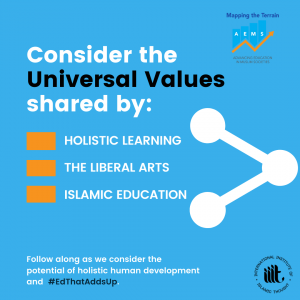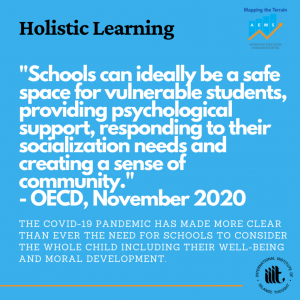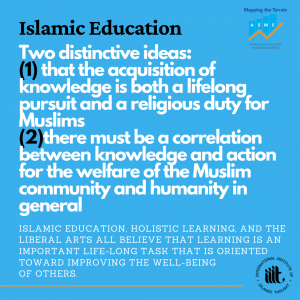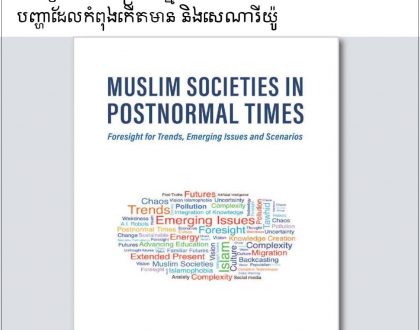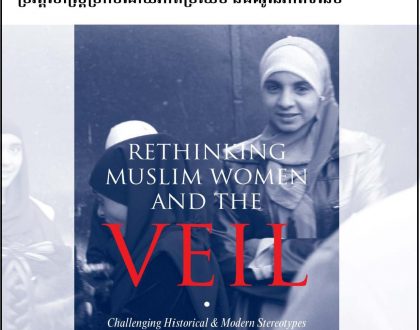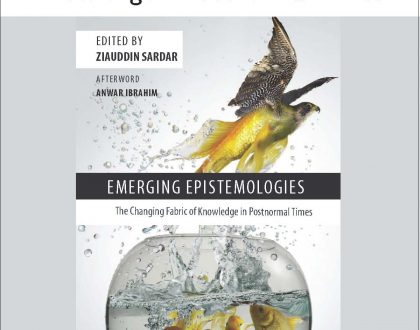AEMS BRIEF #7: HOLISTIC LEARNING, THE LIBERAL ARTS, AND ISLAMIC EDUCATION
In our first six briefs we focused on the objectives and research constructs of the Advancing Education in Muslim Societies (AEMS) initiative and its’ Mapping the Terrain study, with specific attention to the implications for K-12 education and child development. In this brief, we extend our attention to post-secondary education, exploring the connection between Islamic education, the liberal arts, and the holistic education paradigm that motivates empirical research such as Mapping the Terrain. Holistic education and the elevation of social emotional skills goes hand-in-hand with the goals of the liberal arts because it aims to cultivate students that are problem solvers, critical thinkers, capable collaborators, and team players.
As our briefs have argued all along, these skills can and should be introduced in K-12 classrooms and doing so is essential for individual and social transformation. By emphasizing this approach in the K-12 setting – capturing the lower and upper age limits of almost every society’s compulsory education – a generation of young people can be equipped with life skills that will allow them to effectively adapt to any number of professions, tasks, and life circumstances. Incorporating these skills into national education plans may be a relatively new policy objective, but it should be an easy sell: few can argue that a working knowledge of algebra, for example, is of significantly greater importance for the average citizen than the ability to problem solve or collaborate. A recent OECD (2021) report emphasized that “well-being is becoming a core component of national and community level deliberation and is emerging as a critical factor to the development of thriving nations. The unprecedented nature of the pandemic has made evident the need for systemic social and emotional education reform. Therefore, it is imperative… that students’ well-being and education go hand in hand.”
Post-secondary education, however, is more often seen as the time for specialization. Across the globe only a sub-set of a given generation will continue their education onto the post- secondary level, and these will most often do so with a particular profession in mind. Is there room for general, holistic education in college and beyond? Should engineers be taught about responsibility? Do we want medical doctors to spend part of their valuable training time working on their open-mindedness? What role, if any, does religion play in clarifying these questions? In an essay titled “Secularity and the liberal arts: The good, the bad, and the ugly,” Mark Cladis, chair of the religious studies department at Brown University, argues that religious perspectives potentially have much to contribute to the central goals of liberal arts education. Contrary to certain narratives that portray the liberal arts as a secular endeavor, a truly open-minded liberal arts classroom is one that admits but does not privilege religious perspectives.
The framing of religion and the liberal arts as somehow in conflict with each other is further countered by the long tradition of religiously motivated individuals contributing to universal knowledge. Take, for example, Muhammad ibn Zakariya al-Razi, a Persian physician active in the 9th century A.D. who is considered to be the father of pediatrics and one of the earliest proponents of mental health and psychotherapy. In addition to his contributions to the physical practice of medicine, he was a pioneer of medical ethics and the so-called ‘bed-side manner.’ Al-Razi believed that physicians should be modest, soft-spoken, and gentle when communicating with their patients in order to ease the anxiety of receiving unfavorable news, and his reasons for stressing this approach were partially motivated by their effectiveness at promoting positive health outcomes and partially by his Muslim religious beliefs. Al-Razi highlighted the importance of communicating with patients on a personal level rather than simply making them aware of their illness and as recently as 2018 al-Razi’s teachings were being cited to promote medical resident training that serves patients with compassion and understanding.
Al-Razi and other Islamic scientists, scholars, and philosophers such as Ibn Khaldoun, a 14th century Arabian proto-sociologist, clearly advocated for the importance of critical thinking and creativity, with Ibn Khaldoun using his writings to highlight the role critical thinking plays in fostering social cohesion. In our study, university-affiliated AEMS respondents in Muslim societies across a variety of disciplines seemed to follow in this tradition as reflected in their responses. The Mapping the Terrain Report organizes a host of social emotional skills under three umbrella categories of interest: responsibility, open-mindedness, and the collaborative collective. Of the 18,601 people surveyed in the 2019-20 version of the report, 4,399 were university students and 593 were university instructors. The majority of these respondents are Muslim, but some also self-identified as Christians, Hindus, Buddhists, Jews, Atheists, and Agnostics. Participants attended universities in diverse contexts, ranging from public to private to those with religious affiliations and those without. Field researchers reported enthusiasm for the survey and its framing of a holistic approach to education across all contexts, and there does not appear to be a significant relationship between religiosity and willingness to engage with these social emotional learning skills – open-mindedness, responsibility, and the collaborative collective seem to be universal concepts.
The universality of these concepts is important, if not wholly suprising. Many of the most prominent institutional exponents of the liberal arts either have religious roots (i.e. they were originally created as seminaries to train clergy) or maintain explicitly sectarian affiliations (e.g. Jesuit schools). In 2009, Zaytuna College was founded in Berkeley, California, as the first accredited Muslim liberal arts college in the United States. Along with Cambridge Muslim College in the UK, Zaytuna was the subject of a 2016 report titled “Liberal Arts are an Islamic Idea” which framed the two institutions as important mediators between Islamic traditions and modern Muslims and their education in the West. Mapping the Terrain is interested in bringing voices from the Global South into the Western-dominated academic discourse on human development and in working to incorporate elements of universal Islamic values and wisdom into the general education curriculum for all students, regardless of religious background. The impetus for this comes from a recognition that cultural and religious sources of knowledge matter and that any development of so-called ‘universal’ concepts in human development and university curricula must account for their influence. In more thoroughly engaging with these sources of social and spiritual difference, we should be open to the possibility that they will ultimately reveal our sameness. Cladis (2011) writes that “the members of communities of learning need to possess and develop skills for appropriately expressing their convictions and perspectives, listening to those of others, and allowing their own convictions and perspectives to be challenged… Let the liberal arts, then, be liberal, that is, inclusive and generous in its offerings.”
Islamic education and the liberal arts are not in conflict with one another. Of course, certain fundamentalist Islamic educators may struggle with the core tenet of the liberal arts that no single perspective be privileged over others, but research into the diverse and ever-changing landscape of Islamic education has concluded that it is underpinned by two distinctive ideas: that the acquisition of knowledge is both a lifelong pursuit and a religious duty for Muslims, and that there must be a correlation between knowledge and action for the welfare of the Muslim community and humanity in general (Anderson et al, 2011). Modernization efforts in educational systems across the Muslim world do themselves a disservice in trying to sideline Islam in favor of strict secularism. The skills necessary for success in the 21st century can be found within the Islamic tradition, just as they can be found within the Jesuit tradition, or any number of other religious and non-religious approaches. Acknowledging this fact is part of Mapping the Terrain’s broader mission of adopting an asset-based perspective to youth development in the Muslim world.
As this work continues, we hope that you will engage with us in thinking through the implications of this research. You can do that by responding to this email with any thoughts, by following us on Instagram (@iiit_insta) and Twitter (@iiitfriends), and by forwarding this message to anyone in your life who might find it interesting.
Thank you and all the best,
Alex Koenig,
Non-Resident Fellow in Human Development and Education Policy The Advancing Education in Muslim Societies (AEMS) Team
The International Institute of Islamic Thought
